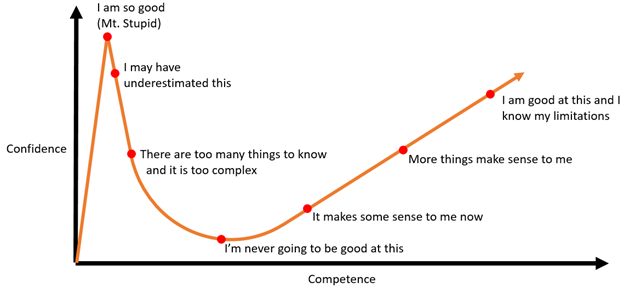“The problem with the world is that intelligent people are full of doubt, while stupid ones are full of confidence”
Charles Bukowski
Charles Bukowski’s quotes are often harsh but true. He quotes that intelligent people are doubtful of their skills and knowledge, while the most novice and unintelligent have the most confidence. This unnatural relationship between intelligence and confidence is known as the “Dunning-Kruger” effect. It is the deviation from rational judgement based on one’s perception of reality, thus leading to an overconfidence of one’s ability. One may believe that they are the expert in a subject matter, without actually knowing what is truly going on.
Why is the Dunning-Kruger effect important? Because it affects everyones’ perceptions of the world, and it may be affecting your actions and your business decisions. In this article, we are going to outline a brief history of the Dunning-Kruger effect and its associated phases. Some symptoms will be outlined before explaining how to use this cognitive bias to your advantage.
What is the Dunning-Kruger effect?
Here is a quick and quirky history lesson. On 19 April 1995, McArthur Wheeler robbed two banks without a disguise because he solemnly believed that putting lemon juice on his face would make it completely invisible. Investigations into this curious case found that Wheeler showed no signs of drug use or alcohol intoxication – Wheeler was just incredibly confident yet comically wrong. This incident formed the basis for social psychologists David Dunning and Justin Kruger’s study on cognitive bias which is now known as the “Dunning-Kruger” effect.
The Dunning-Kruger effect is the cognitive bias where someone with low ability or experience in a particular subject believe that they are incredibly skilled in that subject. Wheeler genuinely believed that lemon juice would make his face invisible, which blinded him from the fact that he was confusing lemon juice for invisible ink. In this way, the Dunning-Kruger effect gives the illusion of confidence. Coincidentally, when experimenting with this effect, many researchers found that the people who are genuinely considered the experts in their field believe that they are only slightly above average.
Phases of the Dunning-Kruger effect
Below is a graph of confidence versus competence. For the purpose of going through the phases, we will use the example of learning how to drive a car. At the beginning (before ever sitting in the driver’s seat), one may believe that they are going to be an excellent driver because their friends and family drive all the time, there are many drivers on the road every day and they make it look effortless. This is known as the peak of confidence, or “Mount Stupid”. Once one gets behind the driver’s seat and starts driving, many things happen: they generally stall, roll, or mount curbs. Their confidence starts to decay. They realize there was an underestimation of all the tasks needed to drive, which shoots down their confidence, even though their competence is growing slowly. After many hours of practice and repetitions, things start to click. Procedures start to make sense. Actions become autonomous (e.g. indicate before turning). With more and more repetitions, one may become a competent and confident driver.

Symptoms of the Dunning-Kruger effect
The Dunning-Kruger effect can be dangerous. In business, it can lead to an underestimation of tasks which may delay your clients’ orders. New technologies that you want to incorporate may seem like a great idea, until you try to use them and realize you need expert training to fully understand how they work. Overconfidence may lead to unrealistic goals which may excite your investors in the short-term, but will leave them underwhelmed in the long-term. Self-proclaimed experts tend to show the following symptoms:
- Overconfidence of their own skills
- Unable to recognize the magnitude of their lack of skills or knowledge
- Fail to recognize genuine skill in experts
It is easy to sit on a couch and criticize a football player for being duped on the field, or we believe that we are going to be better parents than our parents even though we do not have children yet. This cognitive bias affects everyone and is far-reaching. It is foolish to think that one will not be affected by this cognitive bias at some point.
How to use the Dunning-Kruger effect
Certain characteristics can be observed from the graph above. The first phase (Mt. Stupid) explains why some people are extremely confident in the Earth being flat, even though science has proved many times that the Earth is a globe. One can use this phase to find genuine information. In the same way that you would not take investment advice from someone that is not an investor, you can save a lot of money by not listening to the overtly confident inexperienced people who claim they know the next hot stock. If you are in school and want to become an accountant, go speak to an accountant. If you want to start a business, speak to an entrepreneur and acquire their mentorship.
The graph above shows the natural tendency towards mastery. So if you are currently low in confidence with your studies or your search for skills, you need not worry. Any entrepreneur will tell you that there will always be ups and downs. There is no success without failure. Continue to perform repetitions to grow your confidence and to improve your competence. Trust the process and never give up. The great consequence of the Dunning-Kruger effect is that it ensures that you have to work for your success. You have to be humble and get your hands dirty to grow in competence. An anonymous successful trader on Wall Street once told his mentees that “you cannot claim to know basketball by reading a book about the sport and not actually playing it”.
Closing thoughts
The Dunning-Kruger effect has affected everyone at some point. Remember to stay humble and to work hard. There are times when confidence will be shattered, however this is part of the process towards competency. Ask the right questions to the right experts to get quality information to aid in your quest towards competency.
About the author
Trishen Naidoo is the director of Pneuma Capital and co-director of Fulcrum Venture Capital (FVC). FVC have enlisted the services of Nikshen Consulting for business coaching and guidance.


![The Dunning-Kruger effect [Trishen Naidoo]](https://nikshen.com/wp-content/uploads/2021/03/Knowledge-Curve.jpg)


